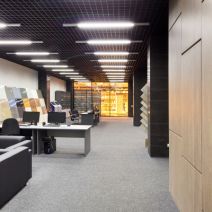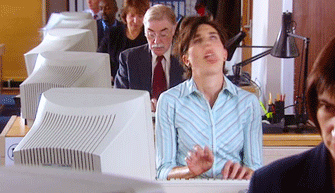RCL Systems Blog
Study Shows that an Open Office Can Hinder Productivity
 The open office is convenient for a number of reasons. It is far more space-efficient, and it makes collaboration easier among coworkers. However, did you know that the open office can make people worse at their jobs? In 2002, a study in the journal Environment and Behavior tracked employees as they were moved from a private office to the open office, and the results were less than desirable.
The open office is convenient for a number of reasons. It is far more space-efficient, and it makes collaboration easier among coworkers. However, did you know that the open office can make people worse at their jobs? In 2002, a study in the journal Environment and Behavior tracked employees as they were moved from a private office to the open office, and the results were less than desirable.
That’s right. The open office actually decreased the overall performance of the employees. It was reported that these workers felt worse about their work environment, their performance, their attitude, and their co-worker relations; all from simply moving to the open office. This was due to a variety of reasons.
 Architectural Privacy vs Psychological Privacy
Architectural Privacy vs Psychological Privacy
When you don’t feel like you can shut the rest of the world out, your ability to work can suffer because of it. This is called architectural privacy. It could be something as simple as shutting the door to your own personal office. Perhaps even the walls of a cubicle could be beneficial to you. But, the fact remains that without architectural privacy, one cannot reach psychological privacy, which can lead to higher performance and satisfaction in the workplace. Psychological privacy is the ability to control whether other employees have access to you. Even if they can just knock on the door to your office, the separation is still there, and can lead to a better work performance.
By removing yourself from the group, you are also removing yourself from the constant feed of background noise that can disrupt your workflow. These factors can lead to impaired memory, aggravated migraines, and ulcers; stress-related symptoms that are common amongst those who work in open offices.
 Introverts Work Their Worst
Introverts Work Their Worst
Your company likely has many different types of workers, and some of them are probably introverts; people who work best when they are isolated from the group, or are generally not very sociable. Solitude generally leads to more creative behavior, so closed offices are ideal for the introverts, who can really allow their unique abilities to shine without the distractions of the open office. In the open office, an introvert’s abilities are severely limited by background noise and disruptive conversation.
 Too Much Multitasking
Too Much Multitasking
Collaboration might have been the goal of the open office, but moving from one task to another has been proven to reduce overall work performance. It takes a lot of mental effort to help one person after another, all while trying to do your own work. In fact, according to the Wall Street Journal, it takes about 27 minutes to regain focus on a particular task after being dragged away by a meeting, a phone call, or helping a coworker with something. This can easily add up to hours of lost time, depending on how much multitasking and distraction occurs in your workplace.
Can Technology Save the Open Office?
For virtually every challenge faced in the office, there exists a business technology to alleviate it. However, given that the productivity problems of the open office go into human psychology and worker personality traits, it’s difficult to find a technological solution to offset such deep-seated problems as these. Solutions like apps that play ambient noise and giving workers mobile technology along with a reliable WiFi network will give them the ability to move to a quieter part of the room if they need to, but ultimately, these are just band-aid solutions and can’t totally offset 100 percent of the distractions found in the open office.
These problems, amidst others such an atmosphere that’s conducive to spreading germs and illness, are some of the biggest reasons why private offices may be the most beneficial option for your employees. What’s your office setup look like? Is it designed to maximize employee productivity, or would your workers admit that, if surveyed, working conditions are poor? Share with us your thoughts in the comments.
When you subscribe to the blog, we will send you an e-mail when there are new updates on the site so you wouldn't miss them.

Comments